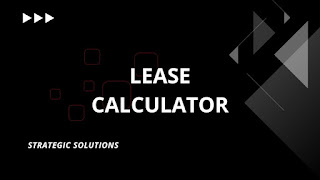Lease Calculator - Strategic Solutions
Lease Calculator
This lease calculator tool allows you to calculate the monthly payment, total payment, and total interest for a lease or loan based on inputs. Simply fill out the form with the required inputs and click the "Calculate" button to get your results. You can also view some frequently asked questions (FAQs) about leases and loans by clicking on the "FAQs" tab.
FAQs
- What is a lease calculator?
- A lease calculator is a tool that helps you calculate the monthly payment, total payment, and total interest for a lease or loan based on inputs such as car price, down payment, loan term, and interest rate.
- What is the residual value in a lease?
- The residual value is the estimated value of the vehicle at the end of the lease term. It can be used to reduce the amount of the lease payments and may be used as the purchase price if the lessee decides to buy the vehicle at the end of the lease.
- Do I need to input the residual value in the lease calculator?
- No, the residual value is optional and depends on the specific lease terms and agreement between the lessee and lessor. If the residual value is not required, you can simply leave that input field blank or remove it from the form.
- What is the difference between a lease and a loan?
- A lease is a contract that allows you to use a vehicle for a certain period of time, typically 2-4 years, with the option to buy the vehicle at the end of the lease. A loan, on the other hand, is a contract that allows you to borrow money to purchase a vehicle and make payments over time, typically 3-7 years.
- What is a down payment?
- A down payment is an upfront payment made when purchasing or leasing a vehicle. It reduces the amount of the loan or lease and can lower your monthly payments and total interest. A down payment is typically a percentage of the vehicle price, such as 10% or 20%.
- What is the interest rate?
- The interest rate is the cost of borrowing money from a lender, typically expressed as an annual percentage rate (APR). A lower interest rate can result in lower monthly payments and total interest over the life of the loan or lease.
Understanding Leasing: A Guide to Common Terms and Concepts
Leasing a car can be an attractive option for those who want to drive a new vehicle without the long-term commitment of buying. However, leasing can also be confusing for those who are new to the process. In this guide, we'll explain some common terms and concepts related to leasing to help you make an informed decision.
Money Factor
The money factor is the interest rate used to calculate the lease payment. It is typically expressed as a decimal and multiplied by the adjusted capitalized cost (the negotiated price of the car plus any fees) to determine the monthly finance charge. A lower money factor means lower finance charges and a lower monthly payment.
Residual Value
The residual value is the estimated value of the car at the end of the lease term. It is used to determine the monthly lease payment, as the lessee only pays for the depreciation of the car over the lease term. A higher residual value means a lower monthly payment, as the car is expected to retain more of its value.
Sales Tax
Sales tax is a tax on the purchase price of the car. In most states, the sales tax is based on the monthly lease payment, rather than the total purchase price of the car. This can add a significant amount to the monthly payment, so it's important to factor it into your calculations.
Fees
There are several fees associated with leasing a car, including acquisition fees, disposition fees, and documentation fees. The acquisition fee is charged by the leasing company to initiate the lease, while the disposition fee is charged at the end of the lease to cover the costs of inspecting and reselling the car. Documentation fees are charged by the dealer to cover the paperwork associated with the lease. These fees can vary depending on the leasing company and dealer, so be sure to ask about them upfront.
Security Deposit
A security deposit is a refundable deposit that is required by some leasing companies to protect against any damage or excess wear and tear to the car. It is typically equal to one or two monthly payments, but may be waived for those with good credit. The security deposit is returned at the end of the lease term, provided that the car is in good condition and all lease obligations have been met.
Capitalized Cost
The capitalized cost is the negotiated price of the car plus any fees, such as taxes and registration fees. This is the amount that is financed over the lease term and is used to calculate the monthly lease payment.
Money Down
Money down, also known as a down payment, is the amount of cash or trade-in value that is paid upfront to reduce the capitalized cost and lower the monthly payment. It is not required for leasing, but can be helpful in reducing the overall cost of the lease.
Excess Mileage Charge
Excess mileage charge is a fee that is charged at the end of the lease term if the lessee exceeds the predetermined mileage limit. The fee is usually a few cents per mile and can add up quickly if the mileage limit is exceeded by a significant amount. It's important to accurately estimate your annual mileage and choose a mileage limit that fits your driving habits.
Disposition Fee
A disposition fee is a fee that is charged at the end of the lease term to cover the costs of inspecting and reselling the car. The fee is typically a few hundred dollars and is deducted from the lessee's security deposit or added to the final lease payment.
Gap Insurance
Gap insurance is an optional insurance coverage that pays the difference between the amount owed on the lease and the actual cash value of the car in the event of a total loss, such as theft or accident. This can be helpful in protecting against large out-of-pocket expenses in the event of an unexpected loss.
Early Termination
Early termination is when the lessee terminates the lease before the end of the lease term. This can result in additional fees and penalties, including early termination fees and excess mileage charges. It's important to carefully consider the lease term and any potential changes in your circumstances before signing a lease.
Conclusion
By understanding these common terms and concepts, you can make a more informed decision about whether leasing is the right option for you. Be sure to read the lease agreement carefully and ask questions if you're unsure about any of the terms or fees.






